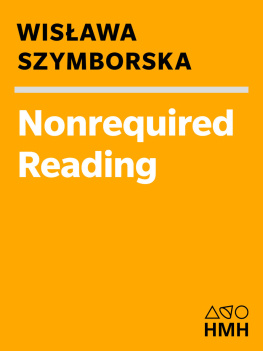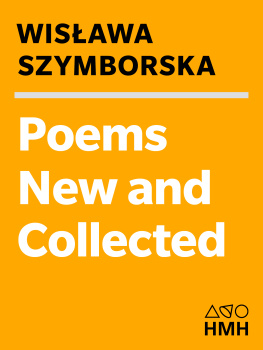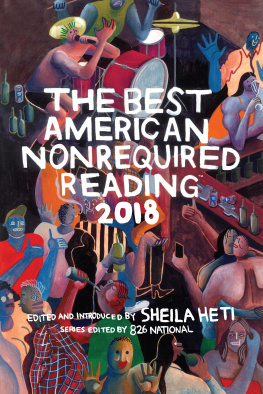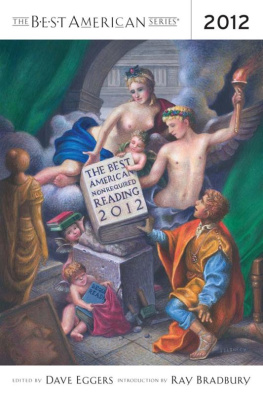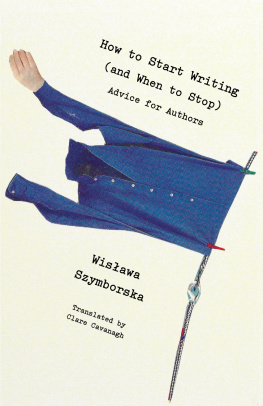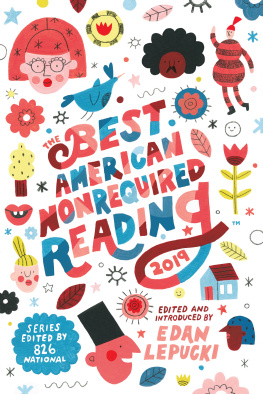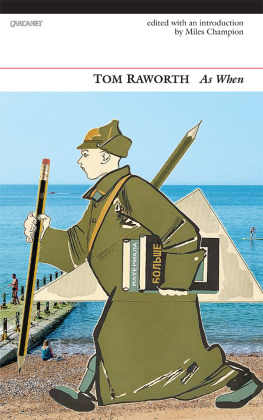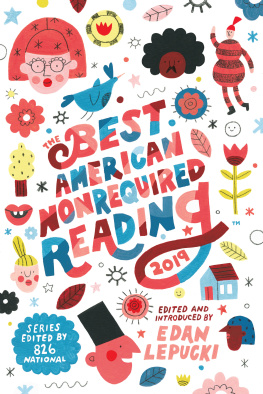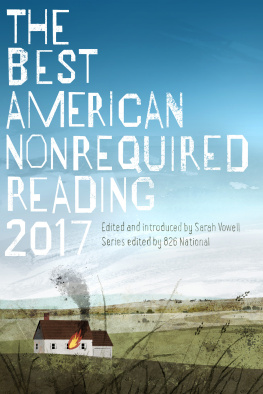
Table of Contents
Copyright 2002 by Harcourt, Inc.
All rights reserved. No part of this publication may be reproduced or transmitted in any form or by any means, electronic or mechanical, including photocopy, recording, or any information storage and retrieval system, without permission in writing from the publisher.
For information about permission to reproduce selections from this book, write to Permissions, Houghton Mifflin Harcourt Publishing Company, 215 Park Avenue South, New York, New York 10003.
www.hmhco.com
The Library of Congress has cataloged the print edition as follows:
Szymborska, Wisawa.
[Prose works. English. Selections]
Nonrequired reading: prose pieces/Wisawa Szymborska; translated from the Polish by Clare Cavanagh.1st ed.
p. cm.
ISBN 0-15-100660-1
1. Szymborska, WisawaTranslations into English.
I. Cavanagh, Clare. II. Title.
PG7178.Z9 A222 2002
028.1dc21 2002002440
e ISBN 978-0-544-61885-5
v1.0315
F ROM THE A UTHOR
I GOT THE IDEA OF writing Nonrequired Reading from the section called Books Received you find in many literary journals. It was easy to see that only a tiny percentage of the books listed later made their way to the reviewers desk. Belles lettres and the most recent political commentary always received privileged treatment. Memoirs and reprints of the classics stood some chance of being reviewed. The odds for monographs, anthologies, and lexicons were much slimmer, though, and popular science and how-to books were virtually guaranteed to go unnoticed. But things looked different in the bookstores. Most (if not all) of the rapturously reviewed books lay gathering dust on the shelves for months before being sent off to be pulped, whereas all the many others, unappreciated, undiscussed, unrecommended, were selling out on the spot. I felt the need to give them a little attention. At first I thought Id be writing real reviews, that is, in each case Id describe the nature of the book at hand, place it in some larger context, then give the reader to understand that it was better than some and worse than others. But I soon realized that I couldnt write reviews and didnt even want to. That basically I am and wish to remain a reader, an amateur, and a fan, unburdened by the weight of ceaseless evaluation. Sometimes the book itself is my main subject; at other times its just a pretext for spinning out various loose associations. Anyone who calls these pieces sketches will be correct. Anyone insisting on reviews will incur my displeasure.One more comment from the heart: Im old-fashioned and think that reading books is the most glorious pastime that humankind has yet devised. Homo Ludens dances, sings, produces meaningful gestures, strikes poses, dresses up, revels, and performs elaborate rituals. I dont wish to diminish the significance of these distractionswithout them human life would pass in unimaginable monotony and, possibly, dispersion and defeat. But these are group activities, above which drifts a more or less perceptible whiff of collective gymnastics. Homo Ludens with a book is free. At least as free as hes capable of being. He himself makes up the rules of the game, which are subject only to his own curiosity. Hes permitted to read intelligent books, from which he will benefit, as well as stupid ones, from which he may also learn something. He can stop before finishing one book, if he wishes, while starting another at the end and working his way back to the beginning. He may laugh in the wrong places or stop short at words that hell keep for a lifetime. And, finally, hes freeand no other hobby can promise thisto eavesdrop on Montaignes arguments or take a quick dip in the Mesozoic.
A BSENT -M INDED P ROFESSORS
A NECDOTES ABOUT GREAT people make for bracing reading. All right, the reader thinks, so I didnt discover chloroform, but I wasnt the worst student in my class, as Liebig was. Of course I wasnt the first to find salvarsan, but at least Im not as scatterbrained as Ehrlich, who wrote letters to himself. Mendeleev may be light-years ahead of me as far as the elements go, but Im far more restrained and better groomed regarding hair. And did I ever forget to show up at my own wedding like Pasteur? Or lock the sugar bowl up to keep my wife out, like Laplace? By comparison with such scientists, we do indeed feel slightly more reasonable, better bred, and perhaps even higher-minded as regards daily living. Moreover, from our vantage point, we know which scientist was right and which was shamefully mistaken. How innocuous someone like Pettenhoffer, for example, seems to us today! Pettenhoffer was a doctor who ferociously battled the findings on bacterias pathogenetic powers. When Koch discovered the comma bacillus of cholera, Pettenhoffer publicly swallowed a whole testtubeful of these unpleasant microbes in order to demonstrate that the bacteriologists, with Koch at their helm, were dangerous mythomaniacs. This anecdote gains particular luster from the fact that nothing happened to Pettenhoffer. He kept his health and scornfully flaunted his triumph until the end of his days. Why he wasnt infected remains a mystery for medicine. But not for psychology. From time to time people do appear who have a particularly strong resistance to obvious facts. Oh, how pleasant and honorable not to be a Pettenhoffer! Scientists in Anecdotes by Waclaw Golebowiez, second edition, Warsaw: Wiedza Powszechna, 1968.
T HE I MPORTANCE OF B EING S CARED
A CERTAIN WRITER WITH a fairly vivid imagination was asked to write something for children. Terrific, he exclaimed. Ive got an idea for something with a witch. The ladies at the publishing house threw up their hands: Anything but witches; you musnt scare the children! What about the toys in the stores, the writer asked, those walleyed teddy bears with magenta fur? I personally approach this from yet another angle. Children like being frightened by fairy tales. They have an inborn need to experience powerful emotions. Andersen scared children, but Im certain that none of them held it against him, not even after they grew up. His marvelous tales abound in indubitably supernatural beings, not to mention talking animals and loquacious buckets. Not everyone in this brotherhood is harmless and well-disposed. The character who turns up most often is death, an implacable individual who steals unexpectedly into the very heart of happiness and carries off the best, the most beloved. Andersen took children seriously. He speaks to them not only about lifes joyous adventures, but about its woes, its miseries, its often undeserved defeats. His fairy tales, peopled with fantastic creatures, are more realistic than whole tons of todays stories for children, which fret about verisimilitude and avoid wonders like the plague. Andersen had the courage to write stories with unhappy endings. He didnt believe that you should try to be good because it pays (as todays moral tales insistently advertise, though it doesnt necessarily turn out that way in real life), but because evil stems from intellectual and emotional stuntedness and is the one form of poverty that should be shunned. And its funny, its just plain funny! Andersen wouldnt be a great writer without the humor that comes in every shade from good-natured laughter to open mockery. But I dont think hed be the great moralist he is if he were just kindness personified. He wasnt. He had his whims and weaknesses, and in daily life he was insufferable. Its said that Dickens first blessed the day that Andersen came to visit him and settled into a little room full of welcoming bouquets. But the second day he blessed was the one that took his guest back into Copenhagens fog. It would seem that two writers who shared so many traits should have looked each other in the eye until the day they died. Well, so it goes.Fifth edition (just imagine!) of Hans Christian Andersens Fairy Tales, translated into Polish by Stefania Beylin and Jaroslaw Iwaszkiewicz, Warsaw: Panstwowy Instytut Wydawniczy, 1969.
Next page
